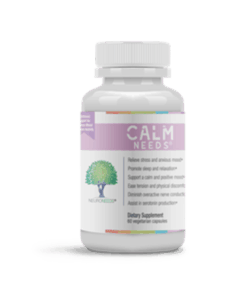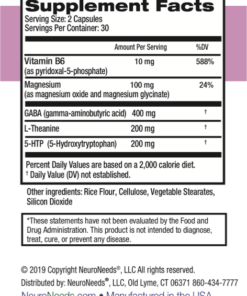The Details
What Is GABA? GABA is an acronym for gamma-aminobutyric acid, an amino acid that is not part of proteins. Up to a third of brain synapses employ GABA, which is the main inhibitory neurotransmitter in the central nervous system. GABA is manufactured in humans. GABA synthesis in humans requires with pyridoxal phosphate (PLP, the active form of vitamin B6) as a cofactor.
What Does GABA Do? As an inhibitory neurotransmitter, GABA reduces neuronal excitability* throughout the nervous system. GABA is often used as a dietary supplement, whereas it has a calming effect*. GABA is also found in other body systems, including the gut, liver, kidneys, reproductive tissues, and immune cells.
What Does a GABA Deficiency Appear as? GABA is made by our bodies and dietary deficiency does not exist.
What About GABA’s Use? As GABA is the chief inhibitory neurotransmitter, increasing GABA’s effects are highly effective for over-excitable states, including nervous mood, poor sleep, relieving stress, and irritability*. Therefore, GABA supplementation often has a calming effect* and is generally used as such. GABA is sometimes used for sleep, motion sickness, or symptoms related to a woman’s menstrual cycle*. GABA is also sometimes used for motion sickness*. Additionally, GABA is often supplemented for promoting improving exercise tolerance, decreasing body fat, and increasing lean body weight*.
What Are the Common and/or Important Side Effects of GABA? GABA is water-soluble and considered to be generally non-toxic. Some sources list potential side effects as nausea, headache, sleepiness, and muscle weakness. However, side effects are rare at usual doses used in supplementation.
Is There Any Laboratory Testing for GABA Deficiency? Laboratory testing is not likely to be of clinical utility other than in screening for a few rare metabolic/mitochondrial disorders in which GABA levels are highly elevated.
Why is GABA Used in CalmNeeds®?
GABA is added to CalmNeeds® for its calming effects*.
*These statements have not been evaluated by the U.S. Food and Drug Administration. This product is not intended to diagnose, treat, cure, or prevent any disease.
Order CalmNeeds® Today


